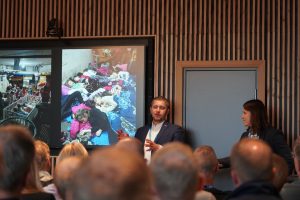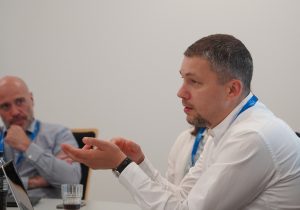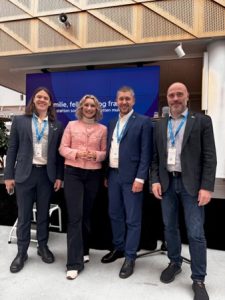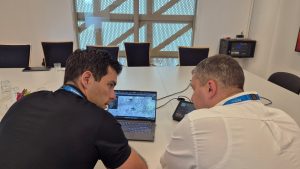
How do you keep society running when the power grid and other critical infrastructure are targeted during war? This was the central question at a powerful session hosted by the Norwegian renewable energy cluster RENERGY during Framtidsfredag, featuring Professor Maksym Karpash from King Danylo University and HEAD of the Precarpathian energy cluster (PEEC), RENERGY’s partner in the EU-
funded SUNRISE project. Framtidsfredag is an annual conference in Norway, bringing together stakeholders from business, research, politics, and public sector together with common people to explore future-oriented solutions in energy, sustainability, and innovation.

Photo: Prof. Maksym Karpash and Sigbjørn Albertsen from the Norwegian-Ukrainian Chamber of Commerce (NUCC)
SUNRISE, supported by the COSME programme, is an essential initiative enabling European clusters to take on the extraordinary effort required to build trust-based, business-to-business cooperation with Ukraine, even under the most demanding circumstances. The project facilitates targeted matchmaking, joint innovation efforts, and the sharing of critical competencies across borders, and across conflict lines.
“Digitalisation and energy infrastructure are closely linked – they influence each other,” said Karianne Tung, Norway’s Minister of Digitalisation and Public Governance.
“Ukraine has made major progress in digitalisation. One day, the war will end – and we must build strong relations now to ensure we are connected when peace returns.”
RENERGY is already working with Ukrainian IT experts who analyse parts of the Norwegian power grid. These emerging collaborations are just the beginning.

Photo: Prof. Maksym Karpash and Thomas Bjørdal, Cluster manager RENERGY
“Through SUNRISE, we aim to build such relationships further,” said Thomas Bjørdal, cluster manager of RENERGY. “There are multiple areas where our respective competencies complement each other. Norway’s experience in environmentally responsible hydropower development, which also helps prevent flooding, is highly relevant for Ukraine, and these long lead-time processes should start now. Battery Cluster Portugal, another SUNRISE partner, can contribute critical expertise in using batteries to stabilise a power grid under pressure or attack.
”
In Norway, Professor Karpash met with companies working in grid solutions, energysystems, power production, drone technology, batteries, and more. Among them was Biodrone, already delivering image analysis for landmine detection in Ukraine.

Photo: Sigbjørn Albertsen from the Norwegian-Ukrainian Chamber of Commerce, Karianne Tung, Minister of Digitalisation and Public Governance, Prof. Maksym Karpash and Thomas Bjørdal

Photo: Prof. Maksym Karpash and Mr. Haugen from Biodrone discuss new applications of drone technology – Biodrone is already delivering its solutions for mine detection in Ukraine.
“Ukraine is showing us how critical infrastructure becomes a frontline in modern warfare,” said Bjørdal. “SUNRISE gives us the platform to turn this experience into new knowledge, and to connect businesses from EU with Ukrainian for lasting partnerships that will be vital both during and after the war.”
The EU-Ukraine Cluster Partnership Programme under the COSME programme is of critical importance for European clusters. It provides the necessary tools and flexibility to mobilise capacity, engage in meaningful collaboration, and respond quickly to both short- and long-term needs. Without this targeted support, the kind of deep and practical engagement seen in SUNRISE would simply not be possible.
